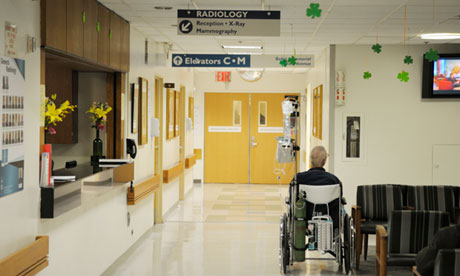
Our health service is held up with pride as an institution that represents democracy at work for many. Yet over the last month alone, research published by the Care Quality Commission suggested that 10% of patients are denied respect and dignity, and 20% have their care and welfare neglected. A report from the Patients' Association depicted NHS care, particularly of the elderly, as "demeaning, painful and sometimes downright cruel". And Ann Clwyd's tears in the House of Commons over her husband's death "like a battery hen" in an NHS hospital, struck a chord with many, not least my family.
In February, our 81-year-old father flew back early from his winter holiday in Bangladesh because he felt unwell. Although he had no serious health problems and was more fit and active than many of his peers, he told us he believed he was nearing the end of his life. "I didn't want to die without my children near me," he kept saying when my four siblings met him and our mother on their return. We told him not to be silly and that he had years in him yet. A day later he fell down the stairs at home and was unable to use them again.
It was from this point that my family embarked on an endless round of GP and hospital visits, throughout which Dad's strength deteriorated in front of us. In the space of two weeks, he became unable to eat or drink and lost mobility as each day passed. At every trip to A&E or GP home visit, I was told there was nothing wrong and that he would get better. After one trip to casualty, Dad was sent home with cough medicine. At the third and final GP visit, I pleaded with the doctor to refer him to hospital so we could find out exactly what was happening. I was told he was suffering a series of mild strokes and, despite the fact that we felt the need for urgency, we faced a fortnight's wait for a hospital appointment.
Feeling we had no other option, we took Dad to a private clinic for a second opinion. Here we met a doctor who was a blessing amid the chaos. She apologised for how we had been treated and told us Dad needed further tests and hospital care. Rather than admit him privately, given that it was an NHS mistake, she spent the next half an hour on the phone and had him admitted to an NHS hospital that night.
We should have been able to rest more easily knowing he was in the best place for him. Unfortunately, it was quite the opposite. I struggled to engage with a system where time and again my frail father did not receive the medicine or food he needed. At one point, he was left in a corridor for five hours while waiting for a CT scan. Chasing up his prescription one day, we were told our account had been closed down and the order cancelled. When seeking authorisation for the prescription from the GP surgery, they had been advised that my father had died. I became subject to the whim of nurses allowing me to be present, even to ask questions about Dad's condition, and had to fight on a daily basis to speak to doctors.
After a week of tests, I began to think Dad's condition could not be that serious or they would have found something by now. How wrong I was. On the morning of 1 March I arrived as normal for the doctors' rounds and saw the consultant in the corridor. His face said it all. "I'm afraid it's bad news," is how he began, and somewhere between that and "not much we can do", he said Dad had advanced-stage gall bladder cancer and was in a palliative situation. It would be a matter of days, weeks if we were lucky, until he died.
My overwhelming feeling was that Dad should not die in hospital. So we again went into battle, this time to get him home as soon as possible. Against the odds, we managed to organise doctors, social workers, order a hospital bed and get him discharged within a week. He was able to spend a month at home before passing away in April.
Looking back, it is easy to seek out someone to blame. Do I blame the GP surgery for failing to spot his condition developing, diagnosing him as having suffered a series of strokes, which subsequent tests did not back up? Cancer can go undetected in many cases, for numerous reasons. Do I blame the NHS for making the whole ordeal harder than it needed to be? I realise that doctors are increasingly under pressure, but what struck me most was the absence of compassion; a failure to respect the patient and the family.
The NHS needs to be more proactive in dealing with cancer, offering empathy to each family who are about to lose a loved one, and understanding that concerns will naturally be raised and should be dealt with sensitively, not with defensiveness. My dad was eventually diagnosed with sufficient time for us to fulfill his last wish and take him home. I wonder how many other families can say the same thing.
Hannah Rose is a pseudonym

